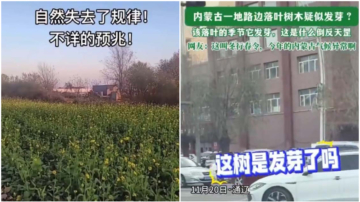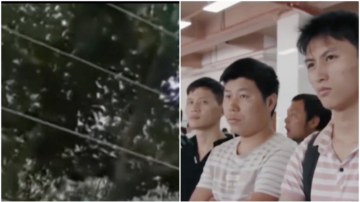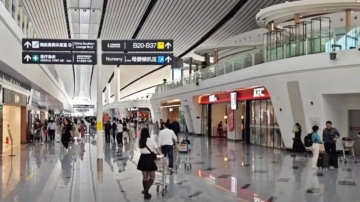【新唐人2013年01月15日訊】最近大陸媒體揭示了一份2012媒體關注度10大榜單。榜單羅列了《中央電視臺》新聞聯播節目使用頻率最高的「十大成語」,其中都是「堅定不移、長治久安」等歌頌中共當局的詞彙。這被專業人士看作是大陸媒體人為了逃避審查,被迫採用這類複雜隱晦的表達方式,對官方喉舌《新聞聯播》進行嘲諷。下面請看本臺記者的報導。
大陸《中國青年報》報導,中國傳媒大學有聲媒體語言監測與研究中心和中國廣播電視年鑑,聯合發佈2012媒體關注度10大榜單,其中包括10大新聞熱點等19類媒體最關注榜單。與官媒《央視》新聞聯播節目直接相關的榜單共有5類。
其中,《新聞聯播》最常使用的10大成語榜單中,「繼往開來」和「堅持不懈」首次進入榜單,而「堅定不移」、「一如既往」、「前所未有」、「長治久安」、 「與時俱進」、「實事求是」、「來之不易」和「豐富多彩」等成語繼續位列10大成語。
這一報導引來網民的關注和圍觀。有網友用「胡說八道」來為《新聞聯播》註解。
也有網友列出一份自創的10大成語,用弄虛作假、恬不知恥、指鹿為馬、粉飾太平、醜態百出等來諷刺《新聞聯播》。
大陸網友張建中:「官媒不也講了嘛,新年獻詞講了:努力說實話。 以前沒說過實話,所以在新的『繼往開來』當中要說『實話』。這透露出好些(好多)信息。」
網友張建中舉例說,現在富士康員工上街抗議的事情官媒根本不報導,但對於退休金上漲100元錢的事情,官媒則全力報導,大肆忽悠,雖然這100元根本抵不上物價的上漲。
大陸網友錢先生也向《新唐人》表示,《央視》是中共當局對老百姓進行洗腦的一個工具,電視節目中充滿了謊言與欺騙。
大陸網友錢先生:「新聞聯播我們都知道,它是共產黨的喉舌,對它都沒法評論。我對他們這些言語、這些詞彙感覺到噁心。」
早前,大陸網上就曾熱傳《新聞聯播》說教模式可以概括為:「前面10分鐘,國家領導人很忙,不是出國就是下鄉。中間10分鐘,全國人民很幸福,不是致富就是豐收。後面10分鐘,其他國家都很慘,不是爆炸就是造反。」
網友還把《新聞聯播》播出的內容總結成:「開會沒有不隆重的」,「講話沒有不重要的」,「人心沒有不鼓舞的」,「成就沒有不巨大的」,「交涉沒有不嚴正的」,「會談沒有不圓滿的」。
原《河北人民廣播電臺》編輯 朱欣欣:「(官媒)所有的宣傳,無論甚麼樣事態的宣傳、新聞,最終都要完全符合核心的官方意識形態。它不能離開這一點。所以時間長了以後,它只能造成語言的殭化。」
原《河北人民廣播電臺》編輯朱欣欣談到,中共這種殭化的意識形態和宣傳方式形成了一種黨文化,造成整個中國社會缺乏理性和個性,受這種黨文化洗腦嚴重的人變得千篇一律、思維殭化,甚至出現智力障礙,但本人卻不自知。
朱欣欣還表示,「十大成語」這則新聞本身,是對《新聞聯播》的嘲諷,這也說明,在大陸媒體人中,也有很多有良知的編輯、和記者。
朱欣欣:「他不甘心於完全當官方的傳聲筒,希望能夠表達自己的意見,但是又不能很清晰的表達自己的看法,只能是隱晦的、採取曲折的方式來表達。」
朱欣欣指出,因為中國沒有言論自由,人們為了逃避審查,被迫採用這類越來越複雜隱晦的表達方式。實際上,這也是社會被扭曲的一種反映。
採訪/朱智善 編輯/李謙 後製/蕭宇
Top 10 List of Idioms Used in CCTV News
A 2012 top 10 list for media was recently released in China.
The list ranks the top 10 Chinese Communist
Party idioms most frequently used in CCTV News.
This top 10 list is seen as media professionals’
mocking CCTV, the official party media.
They have to express it in a complex and obscure way,
to evade Chinese Communist Party (CCP)’s censorship.
The Communication University of China recently
released a ranking list for top 10 media presence.
The listings spans 19 categories, five of which are
directly relevant to CCP official media CCTV News.
In the top 10 list of idioms most frequently used
in CCTV News, “carrying on past traditions and
opening up a way for future” and “unremitting
adherence” was in the list for the first time.
The top eight idioms are “must not waver”, “as ever”,
“unprecedentedly”, “long-term political stability”,
“advancing with the times”, “seeking truth from facts”,
“hard-earned”, and finally, “rich and colorful”.
The news drew attention from netizens.
A netizen commented on CCTV News using
another common phrase, “lying through teeth”.
Another netizen invented his own top
10 list of idioms to mock CCTV News.
This included “resorting to deceit”,
“a dirty shame”, “calling white black”, “whitewashing” and “acting like a buffoon”.
Zhang Jianzhong, China Netizen: “Didn’t the official media
say in its New Year’s goal it would try to speak the truth?
What does that mean? It means that
they haven’t told truth in the past.
So in their new claim of “carrying on past traditions and
opening up a way for future”, they try to “tell the truth”.
This statement has revealed a lot of information.”
Zhang Jianzhong gave an example that official media
never reported on the Foxconn workers protest.
In contrast, it gave all-out reports on the 100-yuan increase
for pensions, although it cannot offset the rise in prices.
Chinese Netizen Mr. Qian views CCTV as a
brainwashing tool for the CCP authorities.
He discerns that CCTV programs are full of lies and deceits.
Mr. Qian: “We all know CCTV News, it’s the CCP’s mouthpiece.
I have no words for it, I just feel
sick on those words in the reports.”
Previously, netizens summarized a “CCTV-News normality”.
“In the first 10-minutes, CCP leaders are very busy,
either going abroad or inspecting the countryside.”
“In the middle 10 minutes, people across China are very
happy, either gaining wealth or reaping bumper crops.”
“In the last 10 minutes, other countries are suffering misery,
either experiencing explosions or confronting rebellions.”
Here are some netizens’ descriptions of CCTV News:
“Every Party meeting has a grand opening.”
“Every leaders speech is significant.”
“All popular morale has to be heartening.”
“Every achievement is tremendous.”
“Every Foreign ministry’s representation is solemn.”
“Every diplomatic talk is a full success.”
Zhu Xinxin, former editor, Hebei official radio station:
“All forms of official propaganda, including media coverage,
have to align with the regime’s ideology, which is a must.
So over a long period of time, they have
created a rigid way of linguistic expression.”
Zhu Xinxin remarks that the rigid CCP ideology
and thick propaganda is a form of "Party culture".
This has made the entire Chinese population
irrational and has lost it’s personality.
Zhu Xinxin says that the "Party culture" brainwashing
has caused people to have rigid thinking patterns.
It has even triggered mental alteration within them, but
they as victims themselves are often unaware of that.
Zhu Xinxin comments that the news of the top 10
list of idioms sets CCTV News as the target of taunting.
This also shows that China still has
many conscientious editors and journalists.
Zhu Xinxin: “They aren’t willing to act as an official
mouthpiece, but want to voice their own opinions.
So they have to express it in a subtle and indirect way.”
Zhu Xinxin explains that due to a lack of freedom
of speech in China, people have to express
in obscure ways, in order to evade censorship.
In fact, it mirrors a kind of distortion of the Chinese mindset.
大陸《中國青年報》報導,中國傳媒大學有聲媒體語言監測與研究中心和中國廣播電視年鑑,聯合發佈2012媒體關注度10大榜單,其中包括10大新聞熱點等19類媒體最關注榜單。與官媒《央視》新聞聯播節目直接相關的榜單共有5類。
其中,《新聞聯播》最常使用的10大成語榜單中,「繼往開來」和「堅持不懈」首次進入榜單,而「堅定不移」、「一如既往」、「前所未有」、「長治久安」、 「與時俱進」、「實事求是」、「來之不易」和「豐富多彩」等成語繼續位列10大成語。
這一報導引來網民的關注和圍觀。有網友用「胡說八道」來為《新聞聯播》註解。
也有網友列出一份自創的10大成語,用弄虛作假、恬不知恥、指鹿為馬、粉飾太平、醜態百出等來諷刺《新聞聯播》。
大陸網友張建中:「官媒不也講了嘛,新年獻詞講了:努力說實話。 以前沒說過實話,所以在新的『繼往開來』當中要說『實話』。這透露出好些(好多)信息。」
網友張建中舉例說,現在富士康員工上街抗議的事情官媒根本不報導,但對於退休金上漲100元錢的事情,官媒則全力報導,大肆忽悠,雖然這100元根本抵不上物價的上漲。
大陸網友錢先生也向《新唐人》表示,《央視》是中共當局對老百姓進行洗腦的一個工具,電視節目中充滿了謊言與欺騙。
大陸網友錢先生:「新聞聯播我們都知道,它是共產黨的喉舌,對它都沒法評論。我對他們這些言語、這些詞彙感覺到噁心。」
早前,大陸網上就曾熱傳《新聞聯播》說教模式可以概括為:「前面10分鐘,國家領導人很忙,不是出國就是下鄉。中間10分鐘,全國人民很幸福,不是致富就是豐收。後面10分鐘,其他國家都很慘,不是爆炸就是造反。」
網友還把《新聞聯播》播出的內容總結成:「開會沒有不隆重的」,「講話沒有不重要的」,「人心沒有不鼓舞的」,「成就沒有不巨大的」,「交涉沒有不嚴正的」,「會談沒有不圓滿的」。
原《河北人民廣播電臺》編輯 朱欣欣:「(官媒)所有的宣傳,無論甚麼樣事態的宣傳、新聞,最終都要完全符合核心的官方意識形態。它不能離開這一點。所以時間長了以後,它只能造成語言的殭化。」
原《河北人民廣播電臺》編輯朱欣欣談到,中共這種殭化的意識形態和宣傳方式形成了一種黨文化,造成整個中國社會缺乏理性和個性,受這種黨文化洗腦嚴重的人變得千篇一律、思維殭化,甚至出現智力障礙,但本人卻不自知。
朱欣欣還表示,「十大成語」這則新聞本身,是對《新聞聯播》的嘲諷,這也說明,在大陸媒體人中,也有很多有良知的編輯、和記者。
朱欣欣:「他不甘心於完全當官方的傳聲筒,希望能夠表達自己的意見,但是又不能很清晰的表達自己的看法,只能是隱晦的、採取曲折的方式來表達。」
朱欣欣指出,因為中國沒有言論自由,人們為了逃避審查,被迫採用這類越來越複雜隱晦的表達方式。實際上,這也是社會被扭曲的一種反映。
採訪/朱智善 編輯/李謙 後製/蕭宇
Top 10 List of Idioms Used in CCTV News
A 2012 top 10 list for media was recently released in China.
The list ranks the top 10 Chinese Communist
Party idioms most frequently used in CCTV News.
This top 10 list is seen as media professionals’
mocking CCTV, the official party media.
They have to express it in a complex and obscure way,
to evade Chinese Communist Party (CCP)’s censorship.
The Communication University of China recently
released a ranking list for top 10 media presence.
The listings spans 19 categories, five of which are
directly relevant to CCP official media CCTV News.
In the top 10 list of idioms most frequently used
in CCTV News, “carrying on past traditions and
opening up a way for future” and “unremitting
adherence” was in the list for the first time.
The top eight idioms are “must not waver”, “as ever”,
“unprecedentedly”, “long-term political stability”,
“advancing with the times”, “seeking truth from facts”,
“hard-earned”, and finally, “rich and colorful”.
The news drew attention from netizens.
A netizen commented on CCTV News using
another common phrase, “lying through teeth”.
Another netizen invented his own top
10 list of idioms to mock CCTV News.
This included “resorting to deceit”,
“a dirty shame”, “calling white black”, “whitewashing” and “acting like a buffoon”.
Zhang Jianzhong, China Netizen: “Didn’t the official media
say in its New Year’s goal it would try to speak the truth?
What does that mean? It means that
they haven’t told truth in the past.
So in their new claim of “carrying on past traditions and
opening up a way for future”, they try to “tell the truth”.
This statement has revealed a lot of information.”
Zhang Jianzhong gave an example that official media
never reported on the Foxconn workers protest.
In contrast, it gave all-out reports on the 100-yuan increase
for pensions, although it cannot offset the rise in prices.
Chinese Netizen Mr. Qian views CCTV as a
brainwashing tool for the CCP authorities.
He discerns that CCTV programs are full of lies and deceits.
Mr. Qian: “We all know CCTV News, it’s the CCP’s mouthpiece.
I have no words for it, I just feel
sick on those words in the reports.”
Previously, netizens summarized a “CCTV-News normality”.
“In the first 10-minutes, CCP leaders are very busy,
either going abroad or inspecting the countryside.”
“In the middle 10 minutes, people across China are very
happy, either gaining wealth or reaping bumper crops.”
“In the last 10 minutes, other countries are suffering misery,
either experiencing explosions or confronting rebellions.”
Here are some netizens’ descriptions of CCTV News:
“Every Party meeting has a grand opening.”
“Every leaders speech is significant.”
“All popular morale has to be heartening.”
“Every achievement is tremendous.”
“Every Foreign ministry’s representation is solemn.”
“Every diplomatic talk is a full success.”
Zhu Xinxin, former editor, Hebei official radio station:
“All forms of official propaganda, including media coverage,
have to align with the regime’s ideology, which is a must.
So over a long period of time, they have
created a rigid way of linguistic expression.”
Zhu Xinxin remarks that the rigid CCP ideology
and thick propaganda is a form of "Party culture".
This has made the entire Chinese population
irrational and has lost it’s personality.
Zhu Xinxin says that the "Party culture" brainwashing
has caused people to have rigid thinking patterns.
It has even triggered mental alteration within them, but
they as victims themselves are often unaware of that.
Zhu Xinxin comments that the news of the top 10
list of idioms sets CCTV News as the target of taunting.
This also shows that China still has
many conscientious editors and journalists.
Zhu Xinxin: “They aren’t willing to act as an official
mouthpiece, but want to voice their own opinions.
So they have to express it in a subtle and indirect way.”
Zhu Xinxin explains that due to a lack of freedom
of speech in China, people have to express
in obscure ways, in order to evade censorship.
In fact, it mirrors a kind of distortion of the Chinese mindset.








